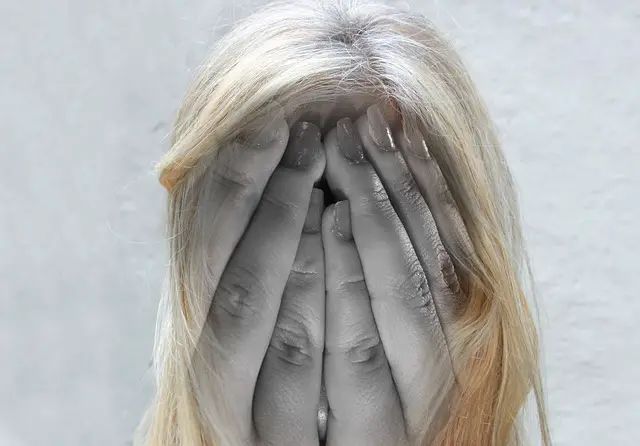Many articles about the menopause focus on the physical effects of “the change of life” and its aftermath.
While it is important to deal with these problems and monitor them on a regular basis, the emotional and psychological aspects of the menopause are important too.
But they are often allocated second place.
This article suggests some ways of beating the depression that often accompanies the menopause.
Physical Symptoms of Menopause
Most women have to contend with some or all of the physical aspects of menopause.
- hot flushes,
- tiredness,
- headaches,
- back pain,
- weight gain,
- loss of sex drive,
- insomnia,
- hair thinning or loss,
- skin dryness,
- osteoporosis,
- increased risk of breast cancer
- heart disease and much more…
Many women also suffer from depression and anxiety.(3)
How Does This Depression Manifest Itself?
 It is not uncommon for women going through the menopause to experience;(4)(5)
It is not uncommon for women going through the menopause to experience;(4)(5)
- feelings of loss of self-respect,
- irritability,
- lack of purpose,
- unattractiveness and solitude.
These are partly the result of some of the physical symptoms of menopause.
They are also due to the realization that a chapter in your life is closed, that you are entering a new era and that your body is telling you that you are past your best.
Many women suffer these symptoms of emotional distress in silence.
A good gynecologist will try to address them as well as dealing with the physical issues.
Often, however, they do not have time to do more than the routine examinations.
However, to lead a healthy and fulfilled life, it is crucial to find a balance between physical and mental/emotional health.
How Can Women Who Go Through This Difficult Phase Help Themselves?
Here are five suggestions for beating the blues.
First, talk about it. If you find it difficult to raise it with your partner, talk it through with a friend.
The chances are that you have women friends of the same age who are going through the same thing but are equally unsure what to do about it.
Just realizing that you are not alone is a big step forward and you can explore together strategies for dealing with it.
Raise it with your gynecologist, even if he/she has a full waiting room. Ask them what they advise in such cases.
If you feel your depression is really unbeatable without help, ask for a referral to a psychiatrist.
Second, make some changes to your appearance. Menopausal depression is often rooted in dissatisfaction with aging and the way you look.
Often, a change of hairstyle to a younger look can give you the lift you need.
Or why not visit a professional make-up artist and learn how to make the best of your features? Take a manicure or have a massage.
A professional masseuse will be able to locate and work on any centers of tension and you will feel great afterward.
Third, go through your wardrobe and think about giving yourself a new style. Discard ruthlessly those clothes that don’t make you feel great and analyze what is good about the clothes you like.
Take professional advice from a stylist. They know how to enhance your best features while camouflaging the parts of your body that you find it difficult to live with.
They will also tell you which colors suit you best – probably those that suited you at 20 won’t do the same for you at 50.
Fourth, take up a new occupation or hobby. It doesn’t matter what it is – learning a language, carpentry, painting, writing, sewing or car maintenance, for example.
Doing something new is a great way to stimulate your brain and is often a good way of meeting new people.
It provides a sense of achievement and fulfillment as well as being enjoyable.
Fifth, take up a new sport or exercise regime. Not only will this help keep your figure in trim but you will feel healthier and fitter as well.
Doing exercise releases endorphins – those hormones known as neurotransmitters that are naturally produced in the brain and give a sense of well-being.
Yoga is an excellent exercise: you can take it up at any age, no matter how unfit you are. There are classes to suit all abilities.
It stretches every muscle in your body, teaches you how to breathe properly and focuses on finding a balance between physical and mental well-being.
Conclusion
Just because you are getting older does not mean you have to enjoy life any less.
If you approach these five ideas with a positive attitude, they will open new horizons as well as beating the menopause blues.
Researches and references
(1)http://www.ncbi.nlm.nih.gov/pubmed/12112996
(2)http://www.ncbi.nlm.nih.gov/pmc/articles/PMC3258455/
(3)https://jeanhailes.org.au/contents/documents/Health_Professionals/Live_webinars/Psychological_aspects_of_menopause_management.pdf
(4)http://www98.griffith.edu.au/dspace/bitstream/handle/10072/28029/54626_1.pdf?sequence=1
(5)http://www.ncbi.nlm.nih.gov/pmc/articles/PMC1446800/
Leave Feedback: Was this article helpful?

